Listen To Our Podcast 🎧

Introduction
Blockchain security for document verification has become a norm for trust in modern trade systems. Several trade organizations now rely on blockchain to secure invoices, contracts, and shipment records. Yet, while it ensures transparency and immutability, the process still lacks the speed and accuracy that supply chains need.
This is where Agentive AI steps in. By combining blockchain’s integrity with AI’s ability to analyse and act, organizations can enable a digital trade document verification technology that automatically handles end-to-end trade workflows.
The Rise of Blockchain Document Security in Global Supply Chains
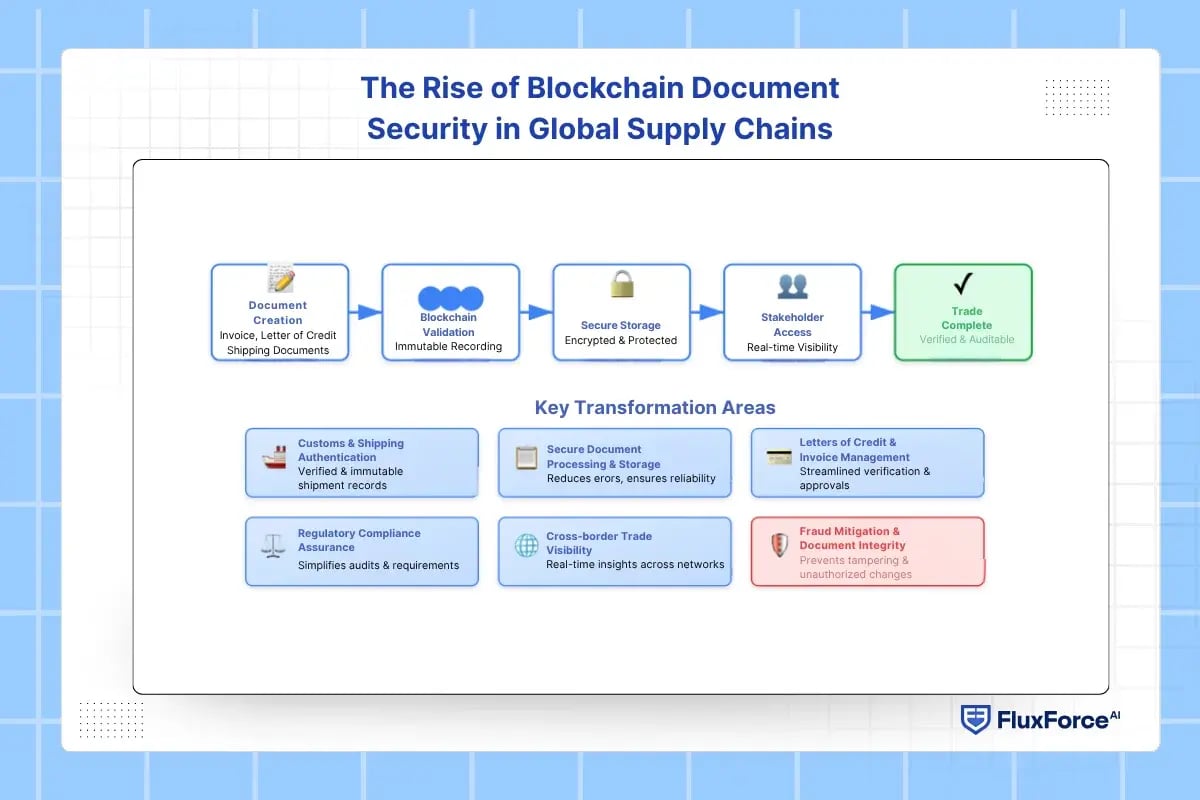
Blockchain adoption is significantly rising among global supply chain environments. Through its transformative secured systems, blockchain-based security provides tamper-proof, auditable, and instantly shareable trade records. Organizations are leveraging these capabilities to improve efficiency, transparency, and trust across trade networks.
Key transformation areas include:
- Blockchain for customs and shipping authentication – Ensures all shipment and customs documents are verified and immutable.
- Secure document processing and storage – Reduces manual entry errors while providing a reliable, auditable record.
- Letters of credit and invoice management – Streamlines verification and accelerates trade finance approvals.
- Regulatory compliance assurance – Simplifies audits and ensures adherence to trade regulatory requirements.
- Cross-border trade visibility – Enhancing real-time insights for stakeholders throughout supply chains.
- Fraud mitigation and document integrity – Reduces risks of tampering and unauthorized changes.
Although blockchain document validation systems are already strengthening trade transparency, their integration with Agentic systems introduces a new layer of intelligence and autonomy.
Why AI and Blockchain Integration is the Future of Trade Workflows ?
In global supply chains, digitalization of trade workflows is the future. As trade volumes grow, ensuring both security and quick decision-making is essential. Integrating blockchain and Agentive AI helps meet these needs effectively.
Blockchain is known for keeping trade documents safe, transparent, and unbreakable. In contrast, AI adds the ability to check, compare, and approve documents automatically. Together, they unlock a trade environment that includes:
- Secure trade processes – Protecting documents from tampering or unauthorized access.
- Faster approvals – Reducing delays in verification and decision-making.
- Reliable operations – Ensuring accurate information flows seamlessly across systems and partners.
The current landscape of the blockchain–AI market is at a growing stage, with projections reaching around USD 973.6 million by 2027. Under logistics and trade finance, this adoption may accelerate as companies that have deployed AI agents have seen significant enhancements in trade workflows.
How Agentive AI Enhances Blockchain-Based Trade Authentication ?
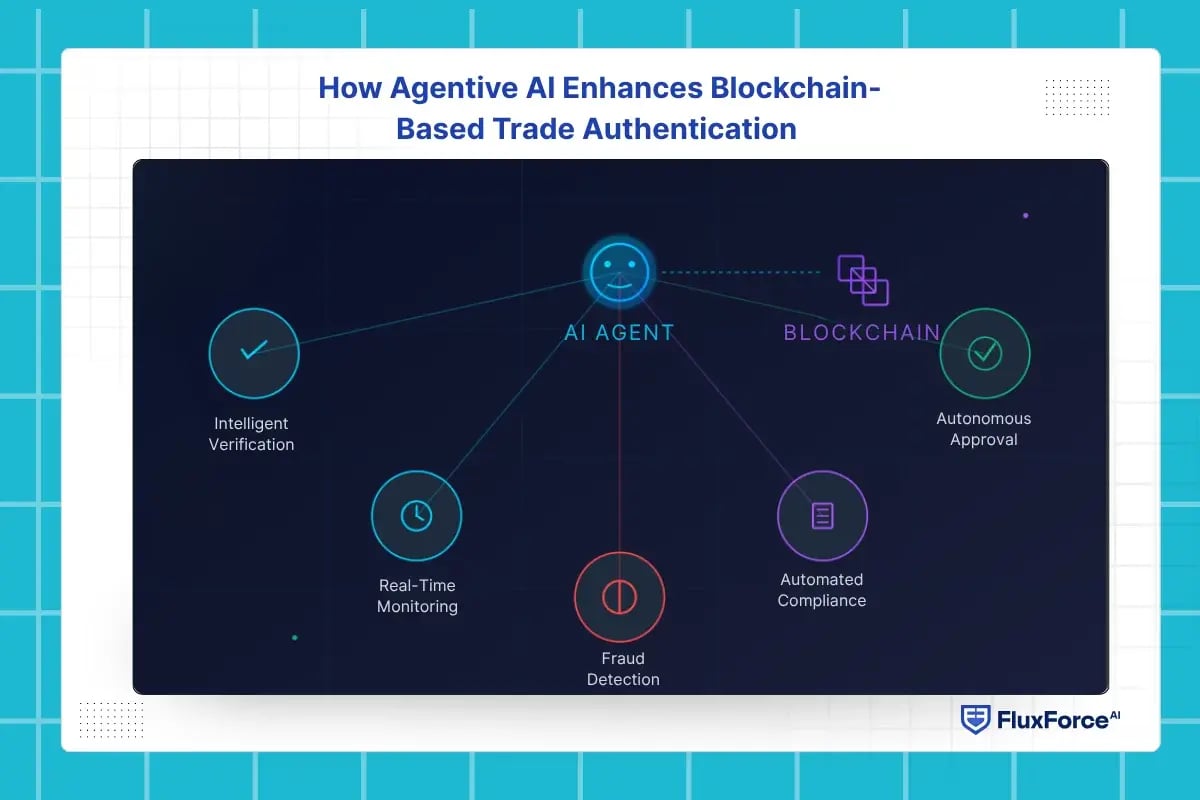
Agentive AI advances the role of blockchain security systems from just securing data to actively managing and verifying it. It removes the need for manual document verification and enables autonomous trade workflows, including:
1. Intelligent Verification of Data Blocks
Agentive AI validates trade-related data before it’s added to the blockchain. It checks document integrity, compares entries, and confirms authenticity to ensure every recorded block reflects verified information.
2. Real-Time Monitoring and Response
An Agentic system tracks blockchain transactions in real time. It identifies irregularities such as duplicate trade entries or missing approvals and resolves them instantly to maintain continuous authentication.
3. Fraud Handling and Alert Systems
By learning from transaction patterns, Agentive AI detects anomalies that indicate potential fraud. When suspicious behaviour appears, it triggers automated alerts for quick investigation and risk control.
4. Automated Compliance Clearance
Agentive AI automates compliance verification across international trade standards. It checks every document against required regulations, ensuring only compliant records move forward for authentication.
Autonomous Approval of Trade Documents
Once data passes validation and compliance checks, AI agents can approve or reject documents automatically. This reduces manual verification effort while maintaining consistent accuracy across the trade process.
With blockchain, verification ensures transparency and integrity. With AI, it becomes intelligent, real-time, and adaptive—capable of responding instantly to changes in trade data or security conditions.

Shaping the Future of AI in Finance
Fluxforce research uncovers how banks and enterprises are adapting to fraud, compliance, and data challenges in 2025.
Key Application Areas of Blockchain-Verified Agentic AI in Supply Chains
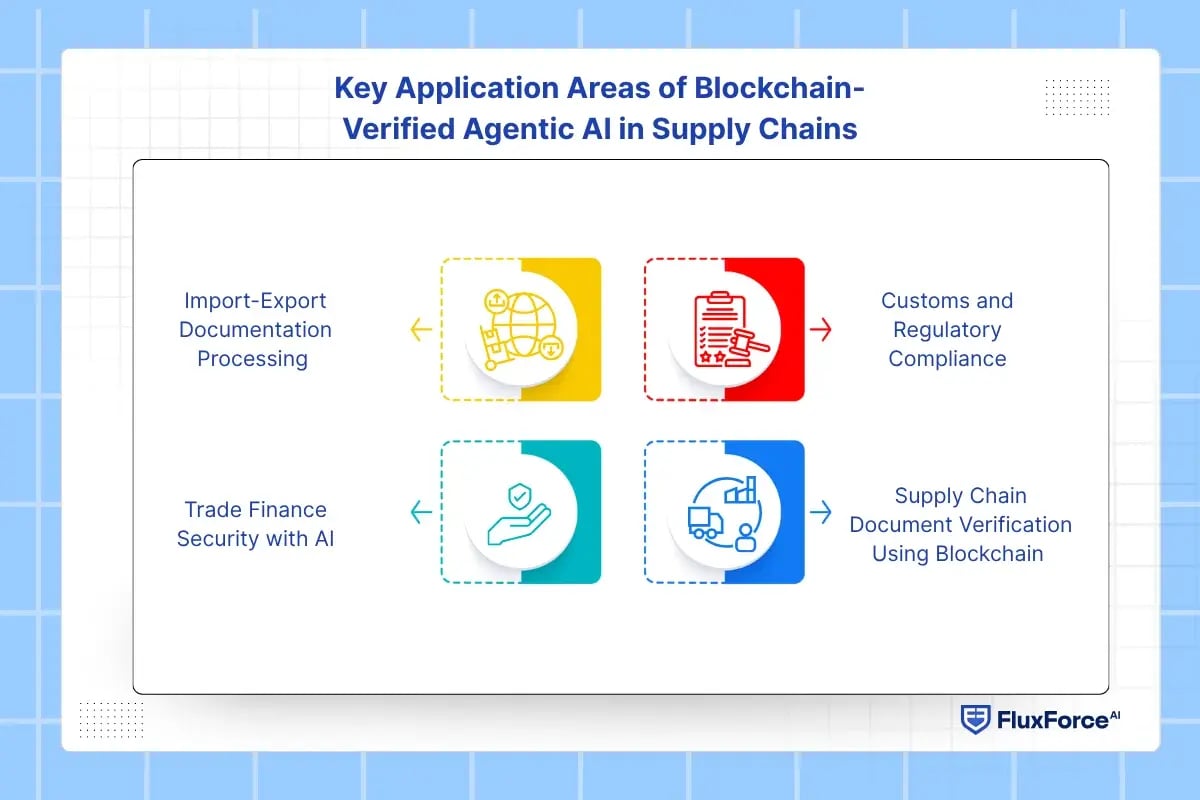
Agentive AI and blockchain work together to strengthen several trade document processes. At every stage, its key focus is to improve verification, compliance, and approval within the supply chain.
1. Import-Export Documentation Processing
AI agents verify bills of lading, commercial invoices, and certificates of origin against blockchain records. Each document gets checked for accuracy, completeness, and regulatory compliance before approval. The system cross-references multiple data sources to catch discrepancies early, preventing customs delays and reducing clearance times by up to 60%.
2. Trade Finance Security with AI
Letters of credit and payment guarantees require multiple verification steps across banks and trading partners. Agentive AI examines these documents against smart contracts stored on blockchain, confirming terms match and all parties have fulfilled obligations.
3. Customs and Regulatory Compliance
Agent-based automation for trade compliance handles the complexity of varying international regulations. The system automatically checks shipment documentation against destination country requirements, flagging issues before goods reach borders. Blockchain provides an audit trail for customs authorities, while AI seamlessly handles the verification workload.
4. Supply Chain Document Verification Using Blockchain
From purchase orders to delivery confirmations, AI agents track document flow across the distributed ledger. They validate each handoff point, ensuring documents are not altered between trading partners. This creates a decentralized document trust framework where all parties can verify authenticity without relying on a central authority.
Real-World Benefits of AI Agents in Document Verification for Global Trade
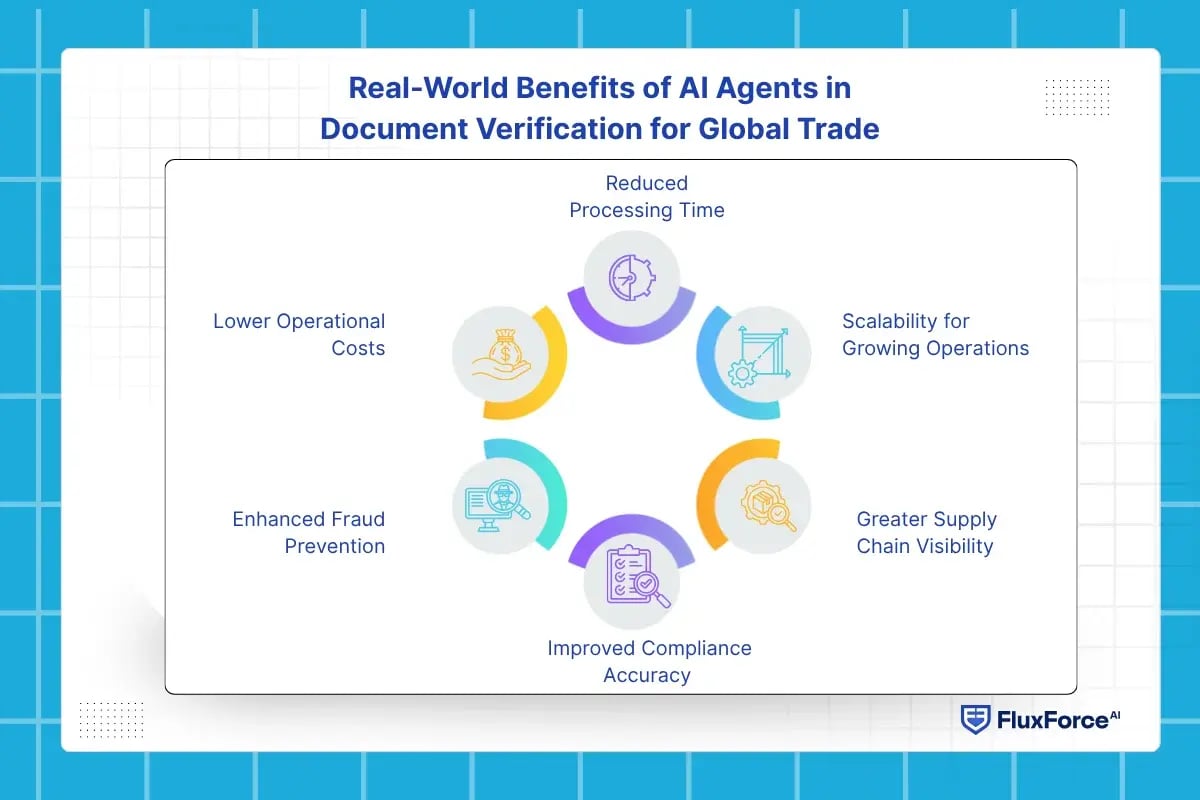
Integrating autonomous AI agents into trade document systems offers measurable, real-world advantages across logistics, shipping, and finance operations. These include:
1. Reduced Processing Time: Document verification that previously took 3-5 days now completes in minutes. AI-powered document validation eliminates waiting periods for manual review, allowing trade operations to move at the speed of digital transactions rather than paper-based workflows.
2. Lower Operational Costs: Companies report a 40-70% reduction in document processing costs after deploying blockchain AI solutions. Fewer staff hours go toward verification tasks, while error rates drop significantly, reducing costly corrections and shipment delays.
3. Enhanced Fraud Prevention: Trade document fraud prevention with AI catches sophisticated forgery attempts that slip past human reviewers. Pattern recognition identifies inconsistencies across multiple documents, flagging potential fraud before financial losses occur.
4. Improved Compliance Accuracy: Automated compliance in trade finance ensures 99%+ adherence to regulatory requirements. The system stays updated with changing regulations across jurisdictions, applying the correct standards to each transaction without manual policy tracking.
5. Greater Supply Chain Visibility: Real-time blockchain audit trails give all authorized parties instant access to document status and verification results. This transparency reduces disputes, accelerates problem resolution, and builds trust among trading partners.
6. Scalability for Growing Operations: As trade volumes increase, blockchain-based document authentication scales without proportional cost increases. The same AI agents handle 1,000 or 100,000 documents with consistent speed and accuracy, supporting business growth without infrastructure overhauls.
Turn Your Data into Real-Time Decisions
Transform your third-party risk management with Agentic AI Agents.
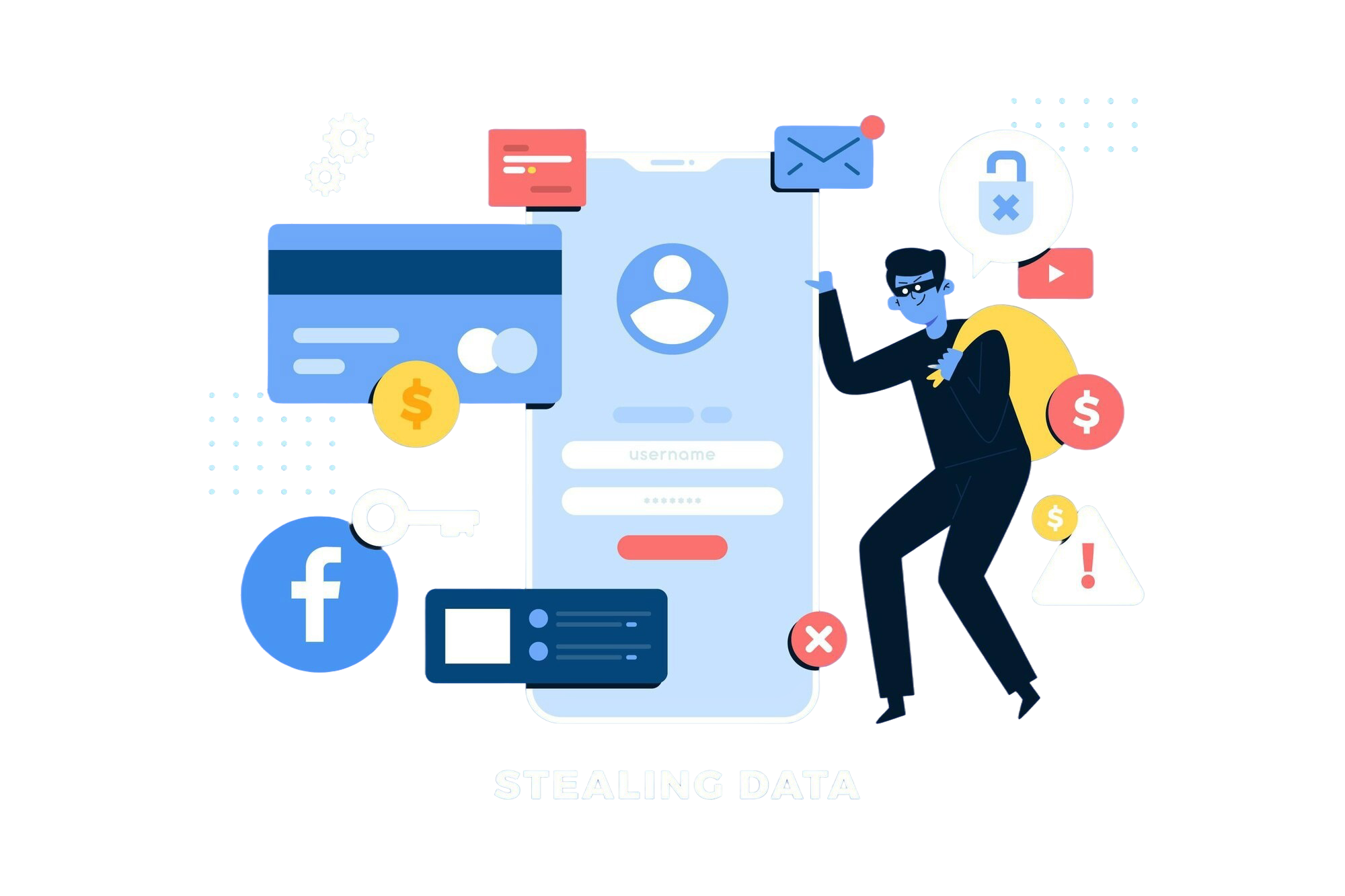
Challenges, Implementation
and Considerations
Using AI with blockchain in trade comes with challenges. These include:
1. Integration Complexity
Connecting AI and blockchain to ERP and logistics systems requires planning. Interfaces need to work correctly. Without proper integration, data may not flow accurately, which can affect document verification and trade efficiency.
2. Data Standardization
Trade documents vary across industries and countries. AI needs consistent formats to interpret data correctly. Standardizing document templates improves processing speed and reduces errors in automated verification.
3. Governance and Access Control
Clear rules are required for who can view or approve documents. Role-based access ensures only authorized personnel can interact with records. This prevents unauthorized changes and keeps blockchain data secure.
4. Scalability and Performance
Global trade involves millions of transactions. AI and blockchain must handle this load efficiently. Systems should scale without slowing processing or verification times, ensuring seamless trade operations.
5. Regulatory Adaptability
Trade rules change frequently across regions. AI models must be updated regularly. This ensures all documents remain compliant with current laws, reducing the risk of penalties or rejected shipments.
Conclusion
Integrating Agentive AI into blockchain-secured document workflows marks a major shift in global trade management. It combines the transparency and immutability of blockchain with the intelligence and automation of AI. Together, they create a system capable of verifying documents in real time, preventing fraud, and maintaining compliance across multiple jurisdictions.
As organizations move toward digital trade ecosystems, adopting AI-driven blockchain document authentication systems will not only streamline operations but also strengthen the global trust framework.


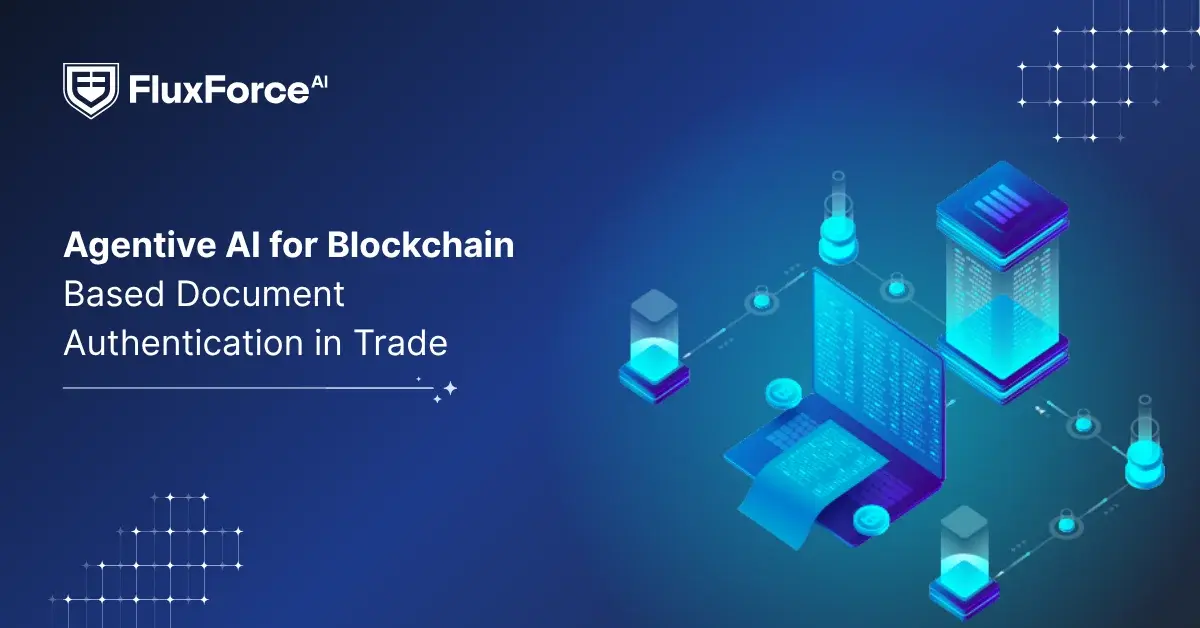
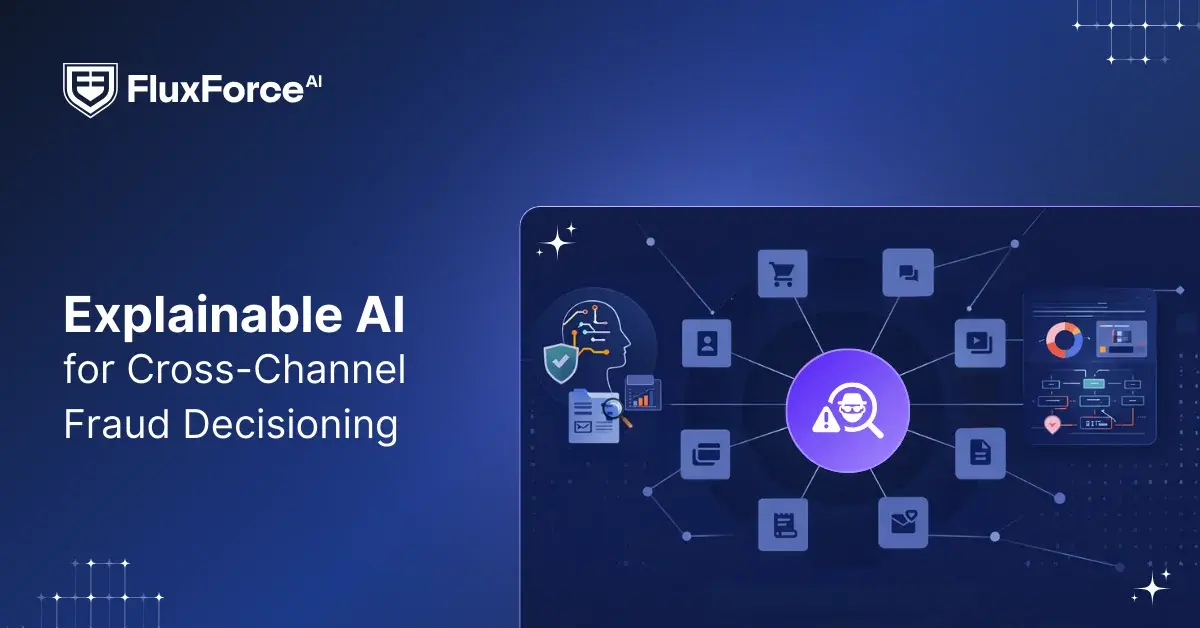
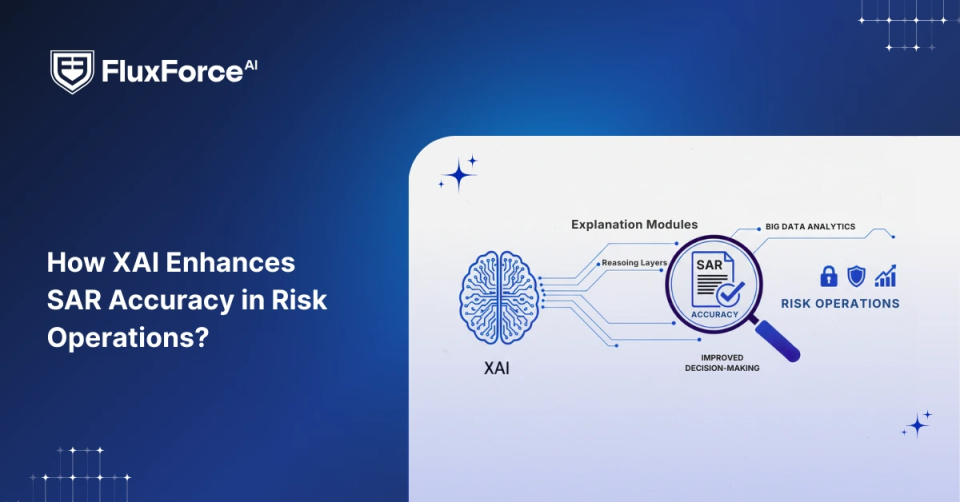
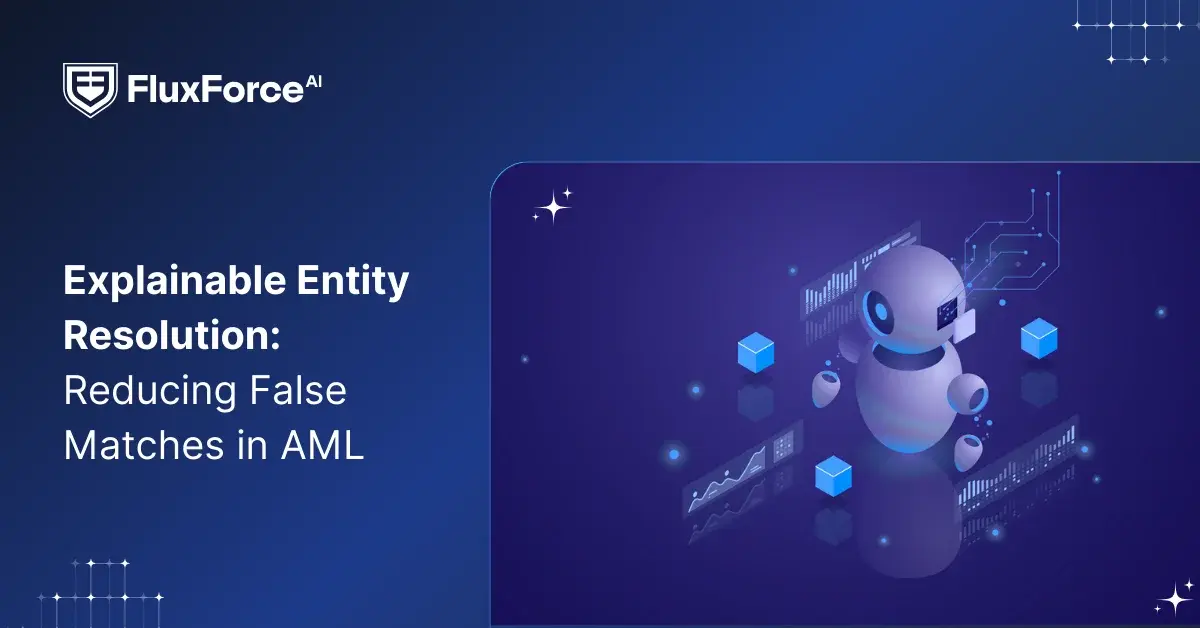
Share this article